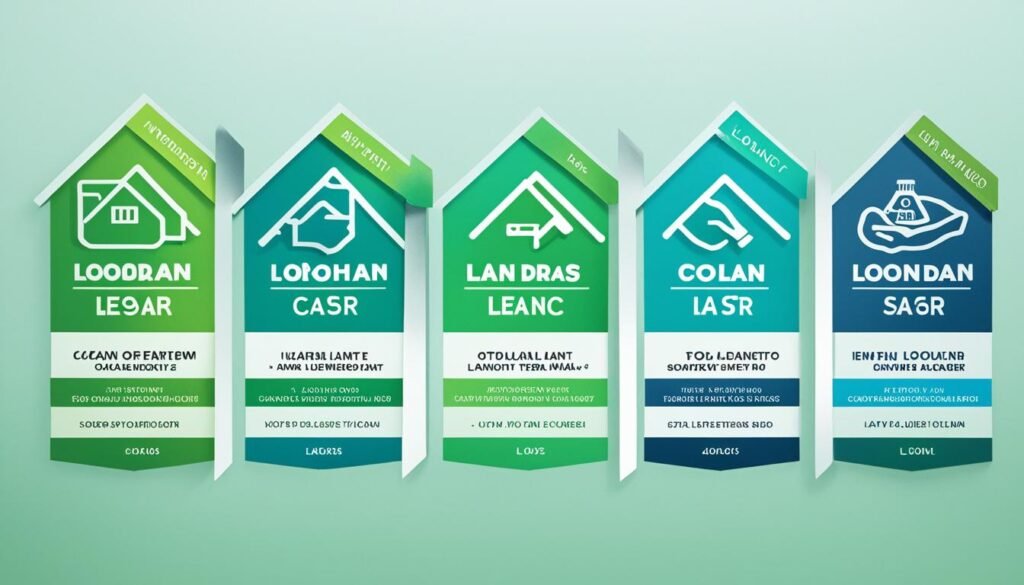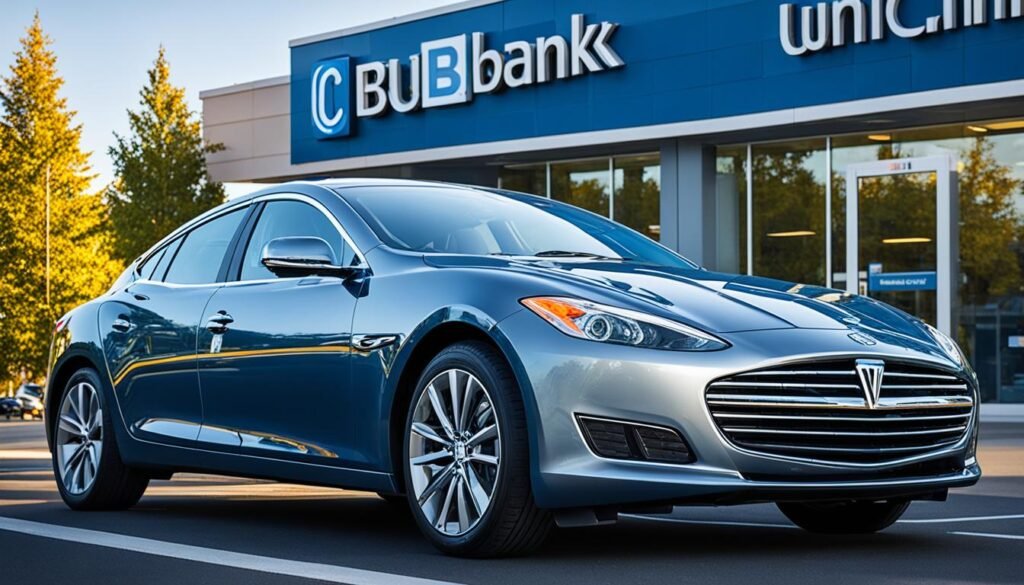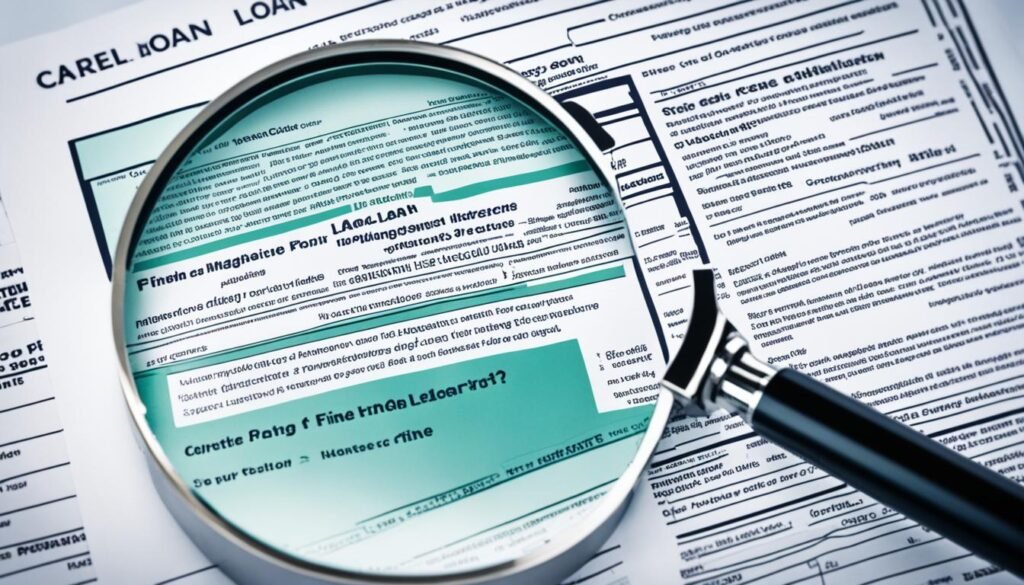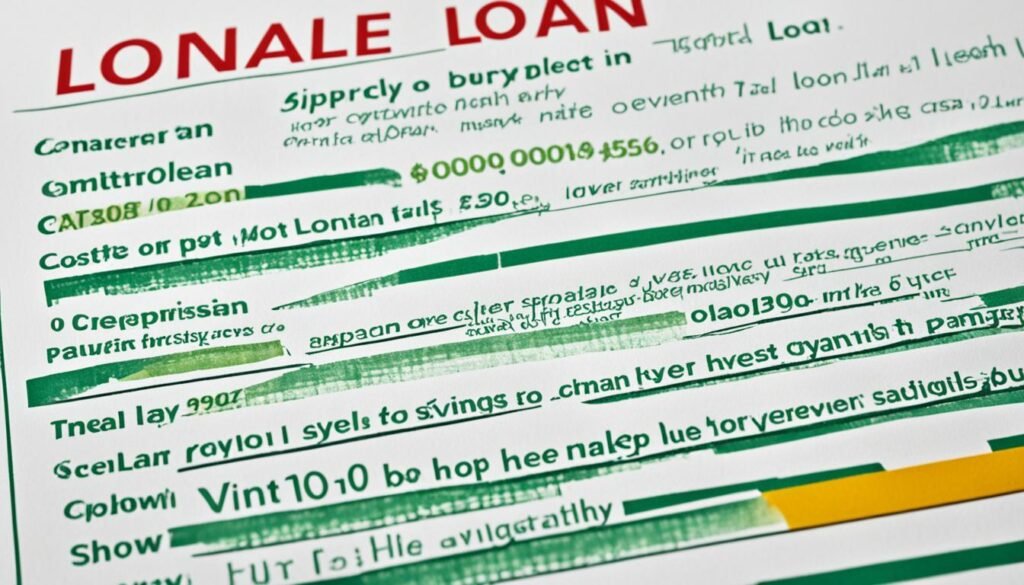Securing a great auto loan is key when buying a car. This article gives you all you need to know. From checking your credit score and setting a budget, to looking at different lenders, getting preapproved, and understanding loan details. This guide will help you through the auto loan process with confidence.
Key Takeaways : The Best Auto Loan
- Understand your credit score and establish a realistic budget for your monthly auto loan payments.
- Research and compare various lenders, including banks, credit unions, and online platforms, to find the best rates and terms.
- Get preapproved for an auto loan to negotiate better terms and have a stronger bargaining position when buying a car.
- Carefully review the fine print of the loan agreement, including fees, penalties, and any additional terms or conditions.
- Focus on the total loan amount, not just the monthly payment, to ensure you’re getting the best overall deal.
Determine Your Credit Score and Budget
Before shopping for an auto loan, know your credit score. It’s vital for understanding your chances with lenders. People with good credit scores of 670 or higher find the best loan deals. If your score’s lower, work on improving it before applying for your loan.
Check Your Credit Score
Your credit score is key in the loan process. You can find your score at your bank, credit card company, or with a free monitoring service. This lets you know which loans you might qualify for and their conditions.
Calculate Your Affordable Monthly Payment
Next, figure out how much you can pay each month for your loan. Consider your income, any debts, and other costs. Aim to keep your car payment under 10% of what you earn every month. This way, you won’t stretch your budget too thin or have trouble managing your loan.
| Factors Affecting Auto Loan Approval | Impact on Approval |
|---|---|
| Credit Score | Higher scores lead to better loan terms and higher chances of approval |
| Income | Your income shows if you can afford the payments |
| Debt-to-Income Ratio | A lower ratio is preferred by lenders, showing you can handle a new debt |
| Down Payment | More down payment means better approval chances and lower rates |
Knowing your credit score and payment limits is crucial. It puts you in a strong position for getting the loan you need. By taking these steps early, you can approach the auto loan process confidently and make smarter choices for your next car.
Also Read : How Do I Find The Best Insurance Policy For Me?
Research and Compare Lenders

Looking for the best way to finance your next car is key. You should check out different auto loan lenders to find the best deals. This is important whether you’re looking at new or used cars. Knowing your lender options makes it easier to choose wisely.
Types of Lenders
There are several choices when it comes to who you can get a loan from:
- Traditional Banks – These are the big, well-known banks that offer auto loans. They are a trusted option for many.
- Credit Unions – These are like community banks owned by their members. They might have good rates and personal service.
- Online Lenders – Digital lenders have made the loan process easier and faster. You can often get quick approval online.
- Dealership Financing – Dealerships also offer financing. This means you can apply for a loan right where you buy the car.
As you explore your options, think about interest rates, fees, and loan terms. It’s also good to read what others say in reviews. All of this will help you choose the best lender for your needs.
| Lender Type | Advantages | Disadvantages |
|---|---|---|
| Traditional Banks |
|
|
| Credit Unions |
|
|
| Online Lenders |
|
|
| Dealership Financing |
|
|
Knowing what each lender type offers can guide you to the right choice. This makes sure you pick a lender that meets your needs and goals. So, look closely when you’re out there comparing lenders.
Also Read :How Does Pet Insurance Work?
Get Preapproved for an Auto Loan

Being preapproved for an auto loan before car shopping has many benefits. It lets you know your interest rate early. You also learn how much you can borrow. This knowledge helps you bargain with dealers.
To get preapproved for a loan is simple:
- First, know your credit score. Lenders check this to see if you qualify and to set your rate.
- Next, compare lenders. Looking around helps you find good rates and deals that suit your budget.
- Then, you give personal info. This may include your job, income, and how much you can put down.
- Finally, you get preapproved. The lender will say yes and give you a letter with your loan offer.
Having your preapproval means you can go car shopping confidently. You’re already set for financing. This makes you a stronger buyer. It helps when you’re talking money with the dealer.
| Benefits of Getting Preapproved for an Auto Loan | Potential Drawbacks |
|---|---|
|
|
Spending time to get preapproved helps make buying a car smoother. It also ensures you get a great deal on your new car.
Also Read : What Is An Installment Loan?
The Best Auto Loan

Finding the best auto loan is key when buying a car. You need to look at many things to get the top deal. Knowing what makes a loan great can help you cut costs and make a smart choice.
Your credit score is very important for a good auto loan. Lenders check your score to decide your interest rate and how much you can borrow. Make sure your score is accurate and fix any mistakes before you apply. This can give you a lower rate and more favorable terms.
It’s also vital to shop around and compare different lenders. To get the best auto loan, you should look at interest rates, fees, loan terms, and any deals lenders are offering. By doing your homework and getting preapproved, you can stay in control and get the best loan for your car.
| Lender | Interest Rate | Loan Term | Fees |
|---|---|---|---|
| Lender A | 3.99% | 60 months | $150 |
| Lender B | 4.25% | 72 months | $200 |
| Lender C | 3.75% | 84 months | $175 |
By comparing your choices and looking at key loan factors, you can get the best terms. This way, you’ll save money over time and make the right financial move for your car purchase.
But the work doesn’t stop after finding some good options. It’s important to carefully read the loan’s details, including any hidden fees. Understanding all about the loan is crucial. Taking these steps will set you on the path to a successful and wise car-buying journey.
Also Read : What Is A Loan Disbursement?
Compare Interest Rates and Terms
When you want the best auto loan, it’s important to look at different lenders. You should compare the interest rates and terms they offer. Start by finding your top choices and then getting quotes from at least three of them. Remember, the APRs you see online might not be what you get.
If you have any preapprovals that are still good, use those to compare. Having a baseline makes it easier to see which offer is best for you. Make sure to carefully look at the loan terms. This will help you pick the one that fits your budget and goals the best.
| Lender | Interest Rate | Loan Term | Monthly Payment |
|---|---|---|---|
| Bank A | 4.99% | 60 months | $350 |
| Credit Union B | 3.75% | 48 months | $450 |
| Online Lender C | 5.25% | 72 months | $300 |
Looking at different lenders will help you find a good deal. By comparing interest rates and terms, you can find a loan that fits your needs. This careful work will make sure you save money over time.
Read the Fine Print Carefully

Know this: reviewing auto loan fine print is essential. It’s vital to grasp the fees and penalties tied to your loan. The TILA makes lenders share all borrowing costs clearly. This way, borrowers are safeguarded from harmful lending practices. Yet, some lenders might not explain everything well, so reading every detail is key.
Also Read :How Do I Get A Loan Without Credit?
Understand Fees and Penalties
Now, let’s tackle understanding auto loan fees and penalties by focusing on these things:
- Origination fees: These are fees charged by the lender for processing your loan application.
- Prepayment penalties: Some lenders may charge a fee if you pay off your loan early.
- Late payment fees: Lenders often charge a fee if you’re late on your monthly payment.
- Loan modification fees: If you need to change the terms of your loan, the lender may charge a fee.
- Repossession fees: If your car is repossessed, you may be responsible for the costs associated with the repossession process.
Reading the fine print well helps you avoid harmful lending practices. It ensures you’re making the best auto loan deal you can.
“Steer clear from lenders who try to hide or gloss over this information.”
Finalize Your Auto Loan

Found the perfect auto loan and lender? Now it’s time to seal the deal. You need to sign the contract and update your car’s title and registration. Knowing these steps well makes ending your auto loan journey easy and stress-free.
Sign the Contract
Ready to seal the deal with your lender? The first thing is signing the auto loan contract. This document is crucial. It explains your loan in detail, like the amount, interest, when to pay, and any extra costs. Make sure you understand everything before you put your name down.
You might also need to show your lender some documents, like insurance proof, before you sign. Get these ready soon to prevent any hold-ups.
Update Vehicle Title and Registration
Sign the loan contract and then focus on your vehicle’s title and registration. You’ll need to do a few things:
- Let your DMV know about the new loan and change the title.
- Give the DMV a copy of your contract and any other papers they need.
- Pay the fees to officially update vehicle title and registration.
Following these steps correctly makes sure your lender’s stake in the vehicle is noted. It also gets you the papers needed to drive legally.
| Step | Description |
|---|---|
| 1. Sign the Contract | Go over the loan in detail, hand in any needed documents, and sign the contract. This legally ties you and the lender. |
| 2. Update Vehicle Title | Let the DMV know about the new loan and change the title to show your lender’s interest. |
| 3. Update Vehicle Registration | Change the registration info to match your new loan. |
Finish these last steps well, and soon you’ll be driving your new car. The right completion of these final steps brings peace of mind with a wrapped-up auto loan.
Shop for the Total Loan Amount, Not Just Monthly Payment

Financing a car may seem simple if you just look at the monthly cost. However, this might mean you pay more in the end. Some lenders offer a lower monthly price by extending the loan term. But, this might increase the total cost because of the extra interest over time.
Looking at the total loan cost is key. You need to think about the interest rate, loan term, and overall cost of the loan. These are more important for your budget and plan than just the monthly fee.
Focusing on the total loan amount helps you see the big picture. It lets you make a choice that meets your money goals. Avoid just looking at the monthly cost. Think about the full loan cost to spend wisely.
| Loan Term | Total Interest Paid | Total Loan Cost |
|---|---|---|
| 36 months | $2,500 | $22,500 |
| 60 months | $4,000 | $24,000 |
| 72 months | $5,500 | $25,500 |
This table shows the loan cost changes with the term, even with a lower monthly payment. By understanding the overall cost, you could do better in your choice. Avoid choosing a longer term loan just for smaller monthly costs.
“Don’t just focus on the monthly payment – look at the big picture and understand the total cost of the loan over its lifetime.”
Understand Different Types of Auto Loans

There are various auto loans to think about when buying a car. You should learn the differences between new car purchase loans and used car loans. This understanding helps you pick the right one for your needs and budget.
New Car Purchase Loans
New car purchase loans are for brand-new vehicles. They come with lower interest rates because new cars are seen as lower-risk. But, new cars lose value quickly, so you might owe more than the car’s value at first.
Used Car Loans
Taking a loan for a used car? This kind of loan suits pre-owned vehicles. Interest rates might be a bit higher, yet used cars don’t lose value as fast. This is good if you’ll keep the car for a while. Also, you normally pay off used car loans earlier. This means you spend less on interest over time.
Before buying new or used, check your finances. It’s important to look at the different types of auto loans out there for great offers. Knowing about new car purchase loans and used car loans helps you make a wise choice that fits your budget and goals.
“The key to finding the best auto loan is to shop around, compare rates and terms, and choose the option that fits your financial needs.”
Consider Your Credit Score Tier
Your credit score plays a big part in what kind of auto loan you get. Lenders look at your score to decide your interest rates. The better your score, the lower your rates and the better your loan terms will be. Knowing where you stand in the credit tiers can help you find the best deal on a loan.
Credit Score Tiers and Auto Loan Rates
Borrowers are grouped by their credit scores into different tiers. Each tier has its own rates and terms. Here’s how it works:
| Credit Score Tier | Average APR |
|---|---|
| Excellent (760-850) | 3.5% – 5.5% |
| Good (700-759) | 5.5% – 8.5% |
| Fair (640-699) | 8.5% – 13.5% |
| Poor (below 640) | 13.5% – 20%+ |
Basically, if your credit score is excellent, you get better rates. Good rates mean you save money during the loan.
Factors Lenders Consider for Auto Loan Approval
Lenders check more than just your credit score. They also look at:
- Income and employment history
- Debt-to-income ratio
- Down payment amount
- Loan term length
- Type of vehicle (new or used)
It’s important to know how these factors affect your loan. Improving in these areas can help you get a better deal on your auto loan.
So, your credit score really matters when getting an auto loan. Knowing how credit tiers work can save you a lot of money. Make smart choices to save when buying a car.
Prequalification vs Preapproval

When you’re looking to get an auto loan, knowing the difference between prequalification and preapproval is key. Many people mix up these terms, but they really do matter when buying a car.
Prequalification is the first step. You share some financial info, like your income and credit score. Then, the lender gives you an estimate of how much you might borrow and the interest rate. Your credit score won’t get hurt because it’s just a soft credit inquiry.
When it’s time for preapproval, things get serious. The lender looks at all your financial info closely. This includes your job, what you owe, your income, and your credit history. They pull a full credit check, called a hard credit inquiry. This can lower your credit score for a while.
The main differences are:
- Depth of information: Prequalification is quick and needs less info. Preapproval looks at your finances in detail.
- Credit impact: Prequalification doesn’t hurt your credit. Preapproval might lower your score temporarily because it’s a full credit check.
- Loan certainty: A preapproval means you have a real loan offer. Prequalification is just a guess at what you might get.
Knowing these differences can guide your steps in getting an auto loan. Starting with prequalification, and then going for preapproval, can help you find the best financing for a new or used car.
| Feature | Prequalification | Preapproval |
|---|---|---|
| Financial Information Required | Limited | Comprehensive |
| Credit Inquiry | Soft | Hard |
| Loan Offer | Estimate | Definitive |
| Certainty of Financing | Lower | Higher |
Understanding the difference between prequalification for auto loans and preapproval for auto loans helps you choose wisely. It can boost your chances of finding the best financing for your upcoming vehicle purchase.
Also Read : Improve Your Score With Self Credit Builders
Conclusion
Getting a good auto loan is key when buying a car. This guide has shown you how to do it right. It includes steps like knowing your credit and budget, and comparing lenders before choosing. It makes sure you’re ready for the best auto loan for your situation.
Always look at the total loan amount, not just the monthly payments. Also, check your credit score tier to aim for the best deal. With these tips, you can be sure you’re making a smart move in your car-buying process. Then, you’ll be driving off in the car you really want.
Remember the critical steps to choose the best auto loan and why it’s so important. Keep these points in mind as you go through the auto loan process. They’ll help you pick a loan that meets your financial goals. This way, you’re on a path to success in owning a vehicle over time.
FAQs
What are the most important factors to consider when getting the best auto loan?
When you look for the best auto loan, think about your credit score first. Next, set a budget you can afford. Then, check out different lenders and compare them. It’s important to get preapproved and understand the loan’s details. Remember, focus on the whole loan cost, not just the monthly payments.
How does my credit score impact the auto loan I can get?
Your credit score affects the interest rate on your auto loan. Those with high scores, usually 670 or more, get better terms. This includes lower interest rates and more favorable loan conditions.
What are the different types of auto loan lenders to consider?
When looking for auto loans, consider banks, credit unions, and online lenders. You can also get a loan through the dealership. They often work with specific lenders.
What are the benefits of getting preapproved for an auto loan?
Preapproval helps you secure your loan rate before car shopping. This can last for up to 30 days. It makes comparing vehicles and negotiating easier.
How can I ensure I get the best possible auto loan terms?
To lock in the best loan terms, compare at least three lenders. Look at the interest rates and loan details closely. Also, make sure to understand all the terms to avoid any surprises later.
What’s the difference between prequalification and preapproval for an auto loan?
Prequalification gives you a rough idea of what you can borrow and at what rate. It uses a soft credit check. On the other hand, preapproval gives you a solid loan offer. The lender checks your creditworthiness thoroughly.
Should I focus on the monthly payment or the total loan cost when getting an auto loan?
Look at the total loan cost rather than just the monthly payment. While lower monthly payments may look good, they can mean paying more in the long run. Consider the whole loan amount and interest rate to find the best deal.
Source Links
- https://www.bankrate.com/loans/auto-loans/how-to-get-the-best-auto-loan-rate/
- https://www.consumerreports.org/money/car-financing/how-to-shop-for-a-car-loan-a2742917735/
- https://www.nerdwallet.com/best/loans/auto-loans/auto-loans-for-good-fair-and-bad-credit




